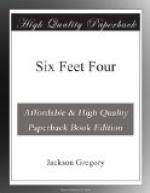Upon the third morning after his return to the range Thornton rose early, scowled sleepily at the little alarm clock whose strident clamour had startled him out of his sleep at four o’clock, kicked off his pajamas and with towel in hand started down to the river for his morning plunge. Subconsciously he noted a scrap of white paper lying upon the hewn log which served as doorstep, but he paid no heed to it. He had his dip, diving from the big rock from which most mornings of the year he dived into the deepest part of the stream; and in a little came back through the brightening daylight rosy and tingling and with the last webs of sleep washed out of his brain. Again he noted the paper; this time he stooped and caught it up. For now he saw that it was folded, carefully placed where he must see it, pinned down with a sharp pointed horseshoe nail.
“Now who’s sending me letters this way?” he demanded of himself.
And he flushed a little and called himself a fool because he knew that he half expected to find that it was a note from a certain girl with unforgettable grey eyes. But before he had read the few words, as soon in fact as his eyes had fallen upon the uneven, laboriously constructed letters of the lead-pencilled scrawl, he knew that this did not come from her hand. The signature puzzled him; it consisted of two letters, initials evidently, a very large j, not capitalized, followed by a very small capital C.
“Now, who’s J.C.?” he muttered. “I can call to mind no J.C. who would be writing me letters!”
As he read the note a look of astonishment came into his eyes. It ran:
“Deer buck, I am shure up against hard luck. Dont know nobody but you can give me a hand remember that time down in El paso I was yore freind. Come to old shack by Poison hole tonight & dont tell nobody & bring sum grub Buck remember El paso.
“j.c.
“p.s. I was yore freind buck.”
Thornton remembered. He went slowly about his dressing, turning again and again to look at the note he had placed upon his little pine table. That had been five years ago. He was riding between Juarez and El Paso, having just sold a herd of steers from the range he had owned in Texas then. He had been detained in the Mexican town until after dark, and before its lights had ceased winking behind him he had known that though his precaution of taking a check instead of gold had saved his money to him it had not saved him from coming very close to death. There were still three scars, two in the shoulder, one in the right side, to show where the bullets had bitten deep into him, from behind. He had been searched swiftly, roughly, his clothing torn by the hurried fingers of the man who had shot him.
It had been close to midnight when his consciousness came back to him. A little man, hard featured but gentle fingered, was working over him. It was Jimmie Clayton. And Clayton had found the crumpled check in the darkness, had gotten the wounded man on his own horse, had taken him to El Paso, and finally had saved his life, nursing him, working over him day and night for the two weeks in which his life was in danger.




